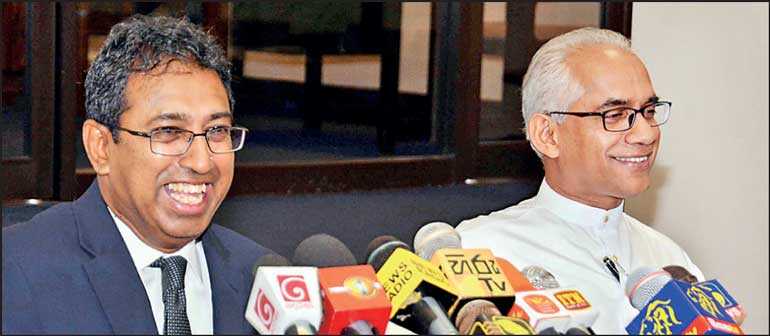Monday Feb 16, 2026
Monday Feb 16, 2026
Friday, 11 January 2019 00:00 - - {{hitsCtrl.values.hits}}

The forthcoming Budget will be mainly focused on Gamperaliya, Enterprise Sri Lanka, establishing an efficient public transport system, and addressing the educational requirements of youth who are unable to pursue higher education due to lack of financial assistance, as well as capacity in higher education institutions, top officials said yesterday.
Addressing the media at Parliament, Non-Cabinet Minister of Economic Reforms and Public Distribution Dr. Harsha de Silva and State Minister of Finance Eran Wickramaratne were upbeat regarding what they termed as one of the best Budgets to be presented, which will provide for public needs and also pay back debt without burdening the people.
According to Dr. de Silva, the Central Bank has assessed the macroeconomic impact of the events linked to 26 October. Publishing its findings in a report, the Central Bank has said there are challenges ahead and the country will have to rebuild investor confidence to stabilise the economy, he said.
“The newly enacted Active Liability Management Act provides the necessary background we wanted to develop the country. But the constitutional crisis hindered our efforts. The rupee dropped along with other countries, but failed to bounce back. Until last week, we were not able to borrow a single US dollar. The currency swap of $ 400 million from Reserve bank of India changed this last week. We will make use of Panda Bonds and samurai Bonds while rebuilding investor confidence,” said Dr. de Silva.
The biggest hit the country took during the constitutional crisis was the poor ratings, Dr. de Silva held. During the 51 days, Moody’s reduced the rating from B1 to B2, S&P from B+ to B, and Fitch Ratings from B+ to B affecting the entire economy and reducing investor confidence.
According to State Minister of Finance Eran Wickramaratne, politicians who are responsible for the constitutional crisis, which led the entire economy to collapse, should be punished without delay. “There is a cost to the constitutional crisis and those responsible should be punished. Members of Parliament should not be allowed to hide behind their privileges and avoid arrest. If ordinary citizens had not acted, we would be behind bars. Parliament privileges are not for breaking the law,” said Minister Wickramaratne.
Identifying the real cost to the economy, Minister Wickramaratne outlined and estimated the financial cost based on the interest loss to be Rs. 21 billion. The cost to the tourism industry is expected to be in excess to $ 250 million. “We are yet to get the actual losses of this constitutional crisis. We also lost millions of dollars of foreign reserves. The highest reserves we had was in April and has come down to $ 7.9 billion in October, which came down further by the end of December. On top of this, we lost foreign investments, grants, and assistance. The challenge comes this year with the scheduled debt payment. But I can say emphatically we have never defaulted and will never default debt. A team with the Finance Minister will go to Washington next week to meet the multilaterals and various establishments to normalise the situation,” added Minister Wickramaratne.
Explaining the areas where people may expect benefits in the forthcoming Budget, Minister Wickramaratne said: “While we are focusing on responsible financial management, we are also continuing to investment in development programs. Gamperaliya is the key focus, which will energise the village economy. During the constitutional crisis, they have stopped this. Enterprise Sri Lanka is the next focus, which is used to strengthen the small and medium organisations. It will be accelerated. The third program is to help the youth. This year we have 168,000 students qualified to enter the universities based on the recent Advanced Level qualifications. But all of them will not be able to get into universities. We consider them all important. We will give them opportunities to receive higher education, which will be announced in the Budget.”
“We are the only middle-income country in South Asia. Many have their own vehicles ranging from motorcycles to diverse vehicles. But we are looking at improving public transport to reduce the costs of transport, time wastage, and also to reduce the difficulties our women experience while travelling. Investment will be made in public transport,” he added. (AH)